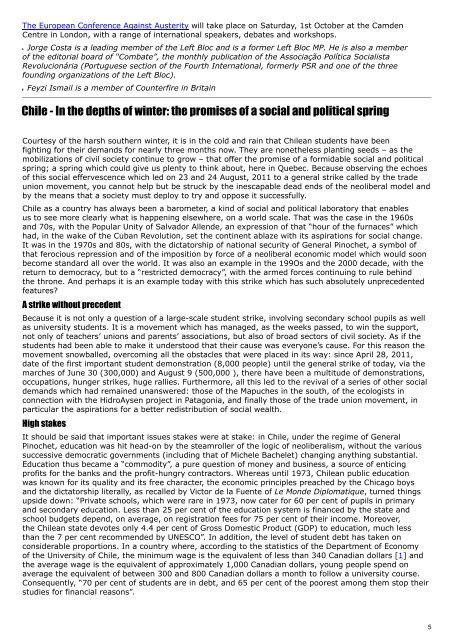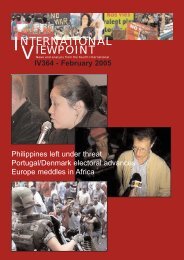here - International Viewpoint
here - International Viewpoint
here - International Viewpoint
You also want an ePaper? Increase the reach of your titles
YUMPU automatically turns print PDFs into web optimized ePapers that Google loves.
The European Conference Against Austerity will take place on Saturday, 1st October at the Camden<br />
Centre in London, with a range of international speakers, debates and workshops.<br />
Jorge Costa is a leading member of the Left Bloc and is a former Left Bloc MP. He is also a member<br />
of the editorial board of “Combate”, the monthly publication of the Associação Política Socialista<br />
Revolucionária (Portuguese section of the Fourth <strong>International</strong>, formerly PSR and one of the three<br />
founding organizations of the Left Bloc).<br />
Feyzi Ismail is a member of Counterfire in Britain<br />
Chile - In the depths of winter: the promises of a social and political spring<br />
Courtesy of the harsh southern winter, it is in the cold and rain that Chilean students have been<br />
fighting for their demands for nearly three months now. They are nonetheless planting seeds – as the<br />
mobilizations of civil society continue to grow – that offer the promise of a formidable social and political<br />
spring; a spring which could give us plenty to think about, <strong>here</strong> in Quebec. Because observing the echoes<br />
of this social effervescence which led on 23 and 24 August, 2011 to a general strike called by the trade<br />
union movement, you cannot help but be struck by the inescapable dead ends of the neoliberal model and<br />
by the means that a society must deploy to try and oppose it successfully.<br />
Chile as a country has always been a barometer, a kind of social and political laboratory that enables<br />
us to see more clearly what is happening elsew<strong>here</strong>, on a world scale. That was the case in the 1960s<br />
and 70s, with the Popular Unity of Salvador Allende, an expression of that “hour of the furnaces” which<br />
had, in the wake of the Cuban Revolution, set the continent ablaze with its aspirations for social change.<br />
It was in the 1970s and 80s, with the dictatorship of national security of General Pinochet, a symbol of<br />
that ferocious repression and of the imposition by force of a neoliberal economic model which would soon<br />
become standard all over the world. It was also an example in the 199Os and the 2000 decade, with the<br />
return to democracy, but to a “restricted democracy”, with the armed forces continuing to rule behind<br />
the throne. And perhaps it is an example today with this strike which has such absolutely unprecedented<br />
features?<br />
A strike without precedent<br />
Because it is not only a question of a large-scale student strike, involving secondary school pupils as well<br />
as university students. It is a movement which has managed, as the weeks passed, to win the support,<br />
not only of teachers’ unions and parents’ associations, but also of broad sectors of civil society. As if the<br />
students had been able to make it understood that their cause was everyone’s cause. For this reason the<br />
movement snowballed, overcoming all the obstacles that were placed in its way: since April 28, 2011,<br />
date of the first important student demonstration (8,000 people) until the general strike of today, via the<br />
marches of June 30 (300,000) and August 9 (500,000 ), t<strong>here</strong> have been a multitude of demonstrations,<br />
occupations, hunger strikes, huge rallies. Furthermore, all this led to the revival of a series of other social<br />
demands which had remained unanswered: those of the Mapuches in the south, of the ecologists in<br />
connection with the HidroAysen project in Patagonia, and finally those of the trade union movement, in<br />
particular the aspirations for a better redistribution of social wealth.<br />
High stakes<br />
It should be said that important issues stakes were at stake: in Chile, under the regime of General<br />
Pinochet, education was hit head-on by the steamroller of the logic of neoliberalism, without the various<br />
successive democratic governments (including that of Michele Bachelet) changing anything substantial.<br />
Education thus became a “commodity”, a pure question of money and business, a source of enticing<br />
profits for the banks and the profit-hungry contractors. W<strong>here</strong>as until 1973, Chilean public education<br />
was known for its quality and its free character, the economic principles preached by the Chicago boys<br />
and the dictatorship literally, as recalled by Victor de la Fuente of Le Monde Diplomatique, turned things<br />
upside down: “Private schools, which were rare in 1973, now cater for 60 per cent of pupils in primary<br />
and secondary education. Less than 25 per cent of the education system is financed by the state and<br />
school budgets depend, on average, on registration fees for 75 per cent of their income. Moreover,<br />
the Chilean state devotes only 4.4 per cent of Gross Domestic Product (GDP) to education, much less<br />
than the 7 per cent recommended by UNESCO”. In addition, the level of student debt has taken on<br />
considerable proportions. In a country w<strong>here</strong>, according to the statistics of the Department of Economy<br />
of the University of Chile, the minimum wage is the equivalent of less than 340 Canadian dollars [1] and<br />
the average wage is the equivalent of approximately 1,000 Canadian dollars, young people spend on<br />
average the equivalent of between 300 and 800 Canadian dollars a month to follow a university course.<br />
Consequently, “70 per cent of students are in debt, and 65 per cent of the poorest among them stop their<br />
studies for financial reasons”.<br />
5









